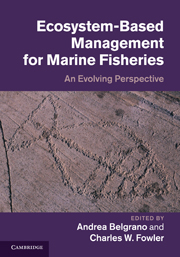Book contents
- Frontmatter
- Contents
- List of contributors
- Foreword
- Acknowledgments for cover artwork
- Introduction
- PART I CURRENT FORMS OF MANAGEMENT
- PART II ELEMENTS OF IMPORTANCE TO MANAGEMENT
- 5 Unintended consequences sneak in the back door: making wise use of regulations in fisheries management
- 6 Population dynamic theory as an essential tool for models in fisheries
- 7 Recovery of former fish productivity: philopatric behaviors put depleted stocks in an unforeseen deadlock
- 8 Boundary shifts: from management to engagement in complexities of ecosystems and social contexts
- 9 Civil society and ecosystem-based fisheries management: traditional roles and future opportunities
- PART III USING PATTERNS
- Afterword
- Index
- Plate section
8 - Boundary shifts: from management to engagement in complexities of ecosystems and social contexts
from PART II - ELEMENTS OF IMPORTANCE TO MANAGEMENT
Published online by Cambridge University Press: 17 February 2011
- Frontmatter
- Contents
- List of contributors
- Foreword
- Acknowledgments for cover artwork
- Introduction
- PART I CURRENT FORMS OF MANAGEMENT
- PART II ELEMENTS OF IMPORTANCE TO MANAGEMENT
- 5 Unintended consequences sneak in the back door: making wise use of regulations in fisheries management
- 6 Population dynamic theory as an essential tool for models in fisheries
- 7 Recovery of former fish productivity: philopatric behaviors put depleted stocks in an unforeseen deadlock
- 8 Boundary shifts: from management to engagement in complexities of ecosystems and social contexts
- 9 Civil society and ecosystem-based fisheries management: traditional roles and future opportunities
- PART III USING PATTERNS
- Afterword
- Index
- Plate section
Summary
Abstract
Three pictures of savanna ecology are used to draw attention to the explicit or implicit boundaries adopted by environmental and resource scientists and to the potential for researchers' accounts to be confounded by the dynamics of what is left outside the boundaries. A series of boundary shifts are introduced through four vignettes that concern environmental research and the management of resources. Researchers can shift from a conventional scientific focus on refining models or representations of complexity to see themselves simultaneously representing and engaging within that complexity. From a focus on product – established knowledge – ecological researchers can embrace process, continually reassessing their knowledge, plans, and action proposals. Science can be seen as science-in-context, so that researchers become more self-conscious about their engagement within the complexity of the social situations that make it possible to do their research. Regarding this last shift, there is a tension between, on the one hand, taking seriously the creativity and capacity-building that seems to follow from well-facilitated participation of diverse people whose livelihood is directly dependent on the ecosystem, and, on the other hand, researchers' professional identities and abilities as people who can contribute systematic analyses of changes that arise beyond the local region or at a larger scale than the local.
Introduction
Günter Grass' 1959 novel, The Tin Drum, begins with its main character, Oskar declaring, “GRANTED: I AM an inmate of a mental hospital …” (Grass 1963).
- Type
- Chapter
- Information
- Ecosystem Based Management for Marine FisheriesAn Evolving Perspective, pp. 248 - 263Publisher: Cambridge University PressPrint publication year: 2011



